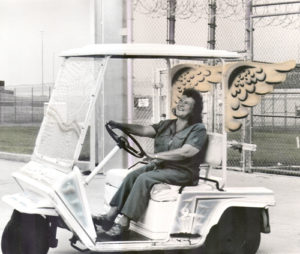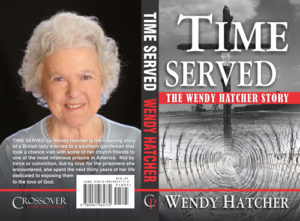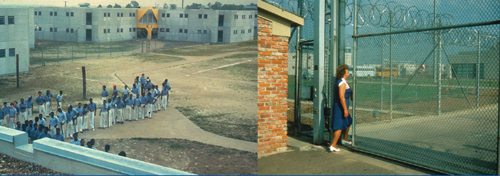By WENDY HATCHER
A recent warm summer afternoon unveiled what was surely a bewildering sight to neighbors in Jackson, Mississippi, as a tiny white-haired lady held a pair of scissors taller than herself in a triumphant ribbon-cutting ceremony for an inmate transitional home that now bears her name. Surrounded by ex-offenders from the state’s prison system, interspersed with former and current prison guards, case managers, deputy commissioners, a district attorney, pastors and community leaders, Wendy Hatcher, the first female chaplain in the state of Mississippi, seemed a bit overwhelmed by all the fuss.
Cameras flashed as former inmates took the microphone, with tears streaming down their cheeks, recounting how Chaplain “Maw” Hatcher believed in them when nobody else knew or cared that their lives held little hope and little chance for a successful future. Her effect on their lives was evident in a big way as one ex-offender after another recounted how her simple faith, in both them and in the God who ultimately transformed their lives, gave them a chance to become who they are today, many years after paying their debts to society.
After more than 30 years of serving God in Mississippi’s prison system, beginning at Parchman Penitentiary (dubbed “Destination Doom” by famed author William Faulkner) and then taking the helm of the Chaplain’s Department of the new Central Mississippi Correctional Facility that opened in Brandon, the now-83-year-old Chaplain Hatcher is honored for her life’s work by the very prisoners whose lives she impacted over the years.
The Wendy Hatcher Transitional Home for newly released female inmates, located in Jackson, officially opened June 18, 2016, coinciding with the release of her new book, titled Time Served, which relates the stories of redemption, failures, successes, hopes and dreams of the thousands of inmates whose lives were impacted by the little lady with a British accent who landed in the Mississippi Delta in 1954.
Chaplain Hatcher grew up in a small fishing village outside London after being evacuated from the heavily bombed city of Coventry during World War II, along with thousands of other young children torn from their homes and families to live out the war in the English countryside. Less than 10 years after the war ended, Wendy met an American sailor from Mississippi and ended up a young bride in the South during what evolved into the turbulent 1960s civil rights marches and the upheaval of a changing society.
Though she had never been to church before arriving in the Delta, Wendy quickly adapted to what she now calls “social Christianity” as the wife of a prominent attorney and judge. Little did she know that God would reveal himself to her in a much more personal way, calling her to a life “behind bars,” ministering to thousands of inmates over decades of her life.

“Soul Patrol” retrofitted golf cart made by prisoners for Chaplain Hatcher to ride
around the prison grounds. Photo by Wendy K. Leigh
Spending up to 14 hours a day within the razor-wired walls of Mississippi’s prisons, the little lady who wouldn’t take no for an answer built two chapels from the ground up— inside the prison compounds of Parchman and CMCF, with no funding, volunteer labor from both inmates and free-world helping hands, and with wrangled donations from churches, individuals, and organizations—structures that are still standing today, a testament to what God can do in spite of obstacles.
Her days and nights included hours counseling and praying with death row inmates in tiny 6×9-foot concrete maximum security cells; comforting prisoners after news of deaths in their families, including their own children whose funerals they could not attend; counseling countless souls in despair and full of regrets over their life choices; and standing up to notorious terrorists, murderers, and thieves who were all, to her, simply sinners in need of God’s love. In the end, they all just called her “Maw,” knowing that regardless of how tough her love was at times, she gave what many had never experienced—hope and compassion.
In the midst of the gloom and doom of life inside prison walls, a parade of programs and ventures cooked up by Chaplain “Maw” Hatcher included prisoner speaking teams, choirs, radio shows, puppet plays, theater productions, Bible studies, gospel music festivals, and even events as diverse as Christian dance troupes and ex-Hell’s Angels motorcycle teams roaring through the prison gates to testify how God can change any life, regardless of past or present transgressions.
Among the ex-offenders present at the opening of the Wendy Hatcher Transitional home were members of the former “Captives for Christ” inmate speaking team, affectionately nicknamed at the time “Wendy’s Gangsters” by the warden, as well as a gifted singer who recorded an gospel album, I’m Free, while serving a life sentence, being driven from the prison in shackles to a recording studio every day. Pauline and Freddie Rogers, ex-offenders and now administrators of the RECH Foundation, worked for years raising money to make their dream of the Wendy Hatcher Transitional Home a reality.

Published by Crossover Publications; Houston, Texas. Photo by William Powell Photography.
Pauline is now the Mississippi Field Director for Prison Fellowship, the national prison outreach organization founded by Chuck Colson after serving time for his role in the Nixon Watergate scandal. She also plans and oversees diverse programs of the RECH Foundation, including the BERCH Reentry program for newly released inmates, helping with work development, job placement, mentoring and counseling. The Wendy Hatcher Transitional Home is located on the BERCH Reentry campus. The Angel Tree outreach program for children of parents who are incarcerated sponsors a 6-week summer camp and other programs throughout the year.
The story of Chaplain “Maw” Hatcher’s life, as well as tales and testimonies from inside the prison walls, is recorded in Time Served; The Wendy Hatcher Story, available online from Amazon and Barnes and Noble, as well as in local bookstores. Organizations and shops interested in the book, or in book signings, can contact Crossover Publications via email at randall.mooney@crossoverpublications.com. Those interested in supporting the Wendy Hatcher Transitional Home can contact Pauline Rogers at rechfoundation@gmail.com.
Wendy K. Leigh is a photojournalist and travel writer from Seattle. She is also one of Chaplain Hatcher’s four children.


